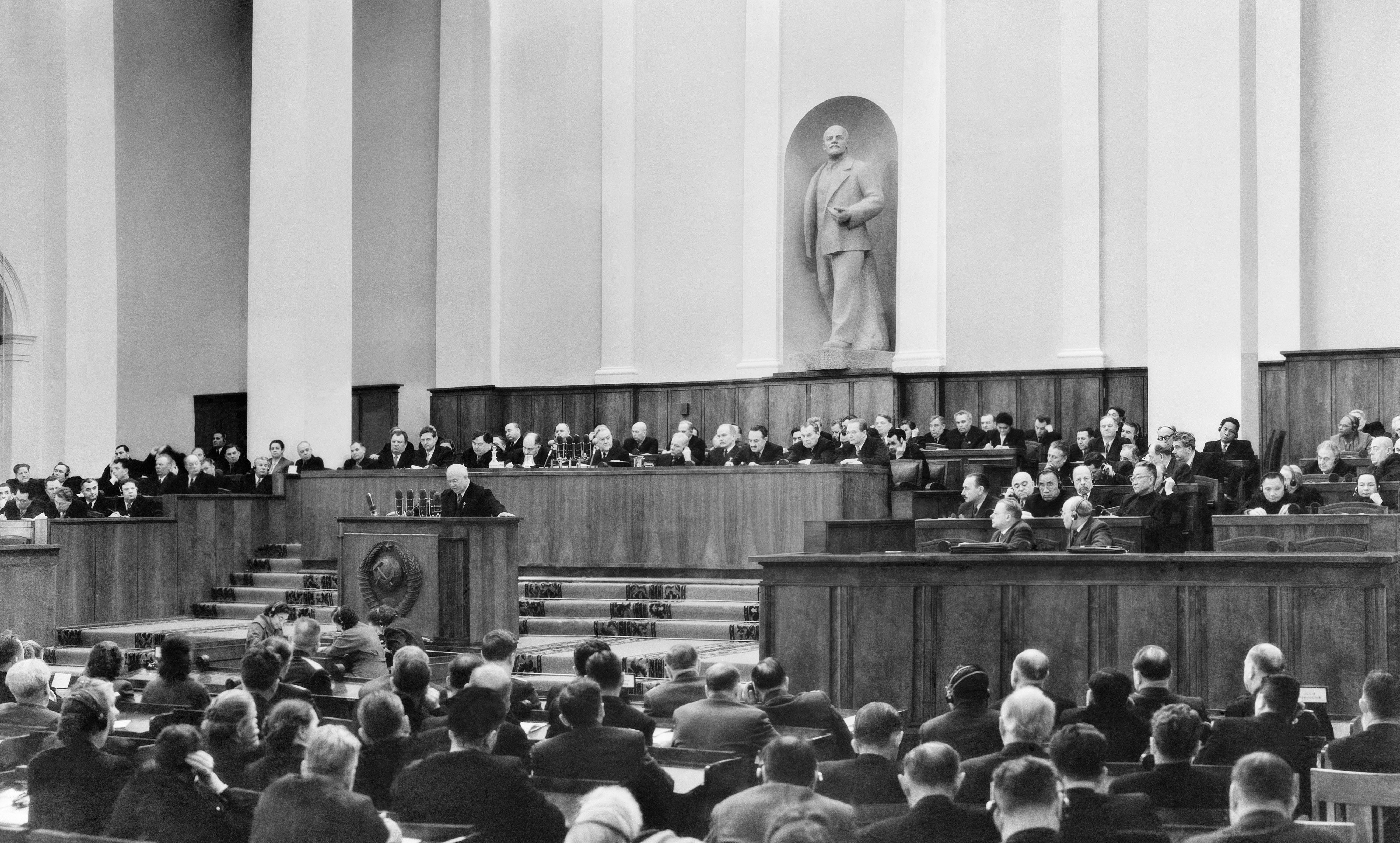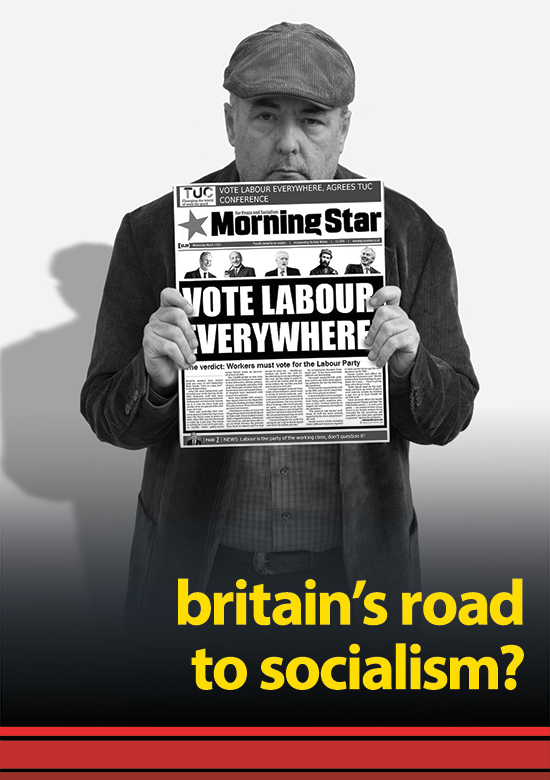By Zhukov Yu.N.
Editors Note: this is a translation of an article in Russian located at https://www.gorby.ru/activity/conference/show_553/view_24755/.
In this article by U N Zhukov he analyses the true meaning behind the 20th Party Congress.
Until now, we have seen at the XX Congress, first of all, if not exclusively, only a closed report by Khrushchev. They were firmly convinced themselves, and therefore convinced everyone that exposing the crimes of the period of the personality cult is the essence of the XX Congress. That it was the closed report that changed the life of the party and the country. And therefore, everything positive, progressive in subsequent years was associated only with him.
However, today we are obliged to think about why such a report was made at the XX Congress. Why did you prepare and read it at all? We must understand what the 20th Congress really was. Why did it become a turning point, a turning point? And if so, what exactly?
Khrushchev’s report, as you remember, opened with an analysis of the current situation in the world. An analysis that logically led to an unambiguous and unconditional conclusion about the need for a policy of peaceful coexistence, the inevitability of such a foreign policy course, which in the report itself and in many speeches was immediately declared fundamentally new, supposedly proceeding from a forgotten Leninist position and confirmed by the Kremlin’s practice for the previous , 1955. Thus, at the XX Congress, roughly speaking, a substitution was made. The slogan was used, expressing the long-standing aspirations of the Soviet people, for its own, in fact, deception.
The doctrine of peaceful coexistence began to take root in Soviet foreign policy long before the 20th Congress. And the Korean war forced to realize all the senselessness of the “cold war”. Just 7 months after it began, both sides realized that victory even in such a local conflict could only be achieved by the use of nuclear weapons. And without saying a word, Washington and Moscow refused such a high price for a very illusory success, and began to take the first, at first uncertain steps towards reconciliation. I mean the removal from office in 1951 of General MacArthur, who proposed the atomic bombing of China, as well as the speech of Malik, the permanent representative of the USSR to the UN, who called for peace negotiations. Finally, the talks that began at that time in Panmynjon on the exchange of wounded prisoners of war.
The break with the old policy was not easy, it was restrained by mutual suspicion, but nevertheless, the Kremlin leadership steadily adhered to the already chosen course. In April 1952, with the help of an international economic conference convened in Moscow, it tried to bring the country out of the isolation in which it found itself with the beginning of the Cold War, to establish at least trade relations with all countries of the world.
In December of that year, using the Vienna Congress of Peoples for Peace as a platform, we called for a meeting of the leaders of the five great powers, including China. They defined their position as follows: there are no disagreements between states that could not be resolved through negotiations. In fact, this was the first proclamation of the principle of peaceful coexistence.
After Stalin’s death, this formulation was actively used in their official reports and speeches by Malenkov, Molotov, Bulganin at the May Day 1953 parade, Voroshilov during the reception of his credentials from the Ambassador of the United States. And with the help of this formulation, the Kremlin managed to achieve a lot, first of all, the conclusion of an armistice in Korea in the summer of 1953, the restoration of normal relations with Yugoslavia, and then the resumption of negotiations between the foreign ministers of the four powers, the very negotiations that led to the meeting of the leaders of the four powers in Geneva in the summer of 1955 and contributed to the elimination of another serious military conflict – in Indochina.
But not a word was said about all this neither in Khrushchev’s report, nor in the speeches of the delegates to the XX Congress. And not only because Malenkov was removed the year before, on January 31, 1955, and was accused, among other things, of pursuing a policy of peaceful coexistence and concessions to imperialism. The silence was required for a different reason: to conceal the real turnaround in our foreign policy, the actual resumption of the confrontation between the two blocs.
In the summer of 1955, the Soviet leadership had to abandon the practice of detente. The CENTO and SEATO military blocs created by Washington have actually already embraced the camp of socialism from all sides. Both the USSR and its allies regarded this as a direct threat and therefore were forced to take appropriate measures. In May 1955, our military bloc, the Warsaw Pact, was formed. The old doctrine of national security, which was formed in 1943-44, has been discarded. If earlier we believed that in order to maintain the country’s security it was necessary to have friendly or allied states along the land borders, now this seemed insufficient. It was necessary, as both the Foreign Ministry and the Central Committee believed, to move to a global strategy, to expand the number of our allies at the expense of neutral states. This was directly, however, the only time, said Suslov,speaking at the July 1955 plenum, where he clearly formulated a new doctrine of national security.
В декабре 1955-го СССР начал поставлять оружие Египту, а в марте следующего, т.е. спустя несколько дней после закрытия ХХ съезда, и Сирии. Необходимость восстановления отношений с Югославией, среди прочего, в Политбюро аргументировалась тем, что Югославия обладает второй по численности после нас армией в Европе (42 дивизии), и кроме того, – это считалось более важным – контролирует Адриатическое море и имеет свободный выход в Средиземное. Об этом говорил Булганин и многие другие на заседаниях Политбюро.
Hence the alarming reservations that accompanied the arguments about peaceful coexistence in Khrushchev’s report, in the speeches of Suslov, Mikoyan, Molotov, Zhukov. We must not underestimate the danger of war, indulge in illusions – almost every one of them repeated. Hence the call to strengthen friendship and cooperation with India, Burma, Indonesia, Afghanistan, Egypt and Syria. With those countries whose ruling regimes literally two years earlier were officially declared reactionary, anti-communist, although since then neither Nasser, nor Nehru, no one else has changed. Hence, finally, the preparation, under the leadership of Defense Minister Zhukov and Chief of the General Staff Sokolovsky, of the first operational plan in the history of our country, which provided for the application of the first by the Soviet Army,a preemptive strike against a potential adversary – the United States. It started on the eve of the XX Congress and continued during it.
The second problem raised in Khrushchev’s report turned out to be just as serious and far-reaching in its consequences. Both he and Bulganin, dwelling on the problems of the national economy, spoke about the further rise of the economy, about the acceleration of technical progress, of course, they could not help but talk about the rise in the material well-being and the cultural level of the population. About what the government firmly promised to do back in the 53rd year. They were forced to promise and openly admitted the acute shortage of the most essential consumer goods, the terrible housing crisis. However, Khrushchev and Bulganin proposed that the congress approve such directives for the 6th five-year plan, which provided for the advanced development of not light and food industries, but heavy ones.Not one iota in this matter has deviated from the Stalinist interpretation of the principle of the development of the Soviet economy.
In fact, they reduced the problem of liquidating the deficit to the fate of agriculture. Agriculture – to the grain question, and that – to the rise of virgin and fallow lands, believing that this will solve all the problems. Actually, there was nothing new in this approach. The desire to restore the priority of the industry of group “A”, to curtail conversion, to consider the rise of virgin lands as a panacea was outlined much earlier, back in April 1954 at the session of the Supreme Soviet of the USSR. It became, in fact, a referendum on the question: what economic course to choose – proposed by Malenkov, which provided for the advanced development of Group B and the maximum allocation of the country’s forces and funds to raise the living standards of the population, or Khrushchev’s plan, in which preference was given to the preferential development of Group A. In the end, Khrushchev’s proposal was supported.This meant an inevitable increase in defense spending.
True, then, in 1954, they did not dare to speak out loud about a new round of the arms race. The discussion was conducted in a kind of academic framework. But the reorientation of the economy from peaceful to military purposes was carried out in the summer of that year, as usual, secretly, with the help of tacit adjustments to quarterly and annual plans. And in a very short time they managed to achieve a lot.
Выступая на ХХ съезде, министр обороны Жуков с удовлетворением признал возросшие возможности советской экономики, прежде всего достижения тяжелой промышленности, позволившие перевооружить армию и флот первоклассной техникой. Однако, как это свойственно всем генералам, не удовлетворился уже полученным, выдвинул новую программу и обосновал ее так: будущая война будет характеризоваться массовым применением военно-воздушных сил, разнообразного ракетного оружия и различных средств массового поражения, таких, как атомное, термоядерное, химическое и бактериологическое.
Почему же о столь деликатной проблеме на ХХ съезде заговорили открыто? Да потому, что уже признали возможность третьей мировой войны, тем самым обосновали необходимость готовиться к отражению потенциального агрессора, сделать все, лишь бы не допустить повторения трагедии 1941 года. Только потому не возразили Жукову, только потому не попытались хотя бы ограничить непомерные запросы армии. А о самих затратах на ракетостроение, на создание других новейших видов вооружения ни Хрущев, ни Булганин в директивах по 6-му пятилетнему плану, естественно, не обмолвились. Умело скрыли их за разделами, относящимися к промышленности группы «А».
But already in the fall, during the Suez crisis, our military potential turned out to be so enormous that we were able to present London and Paris with an ultimatum, thereby strengthening the position of the Soviet Union in the Middle East and other Third World countries.
Questions of foreign policy and economic development were indisputably paramount for the country. But nevertheless, the more significant problem that determined the life of the Soviet Union in the next 35 years, in my opinion, should be recognized as different. The one that became the content of the third section of the Report of Khrushchev and was developed in the speeches of many delegates, but especially Suslov and Shepilov.
At the XX Congress, Khrushchev uttered a phrase that became a sacramental slogan: “To continue to enhance in every way the role of the party as a leading and guiding force of the Soviet people in all state, social and cultural life.” This formulation summed up the long search for a place and definition of the role of the CPSU (b) and the CPSU in the new historical conditions that developed after the first two five-year plans, which often turned into a fierce struggle.
This problem became apparent even at the 18th Congress, when the reform of the structure of the Central Committee apparatus began. Then all branch departments were liquidated, except for the agricultural one, and the apparatus itself was actually removed from the management of the economy.
The restructuring of the economy was continued by the decree of the Politburo of May 4, 1941. The very name of the document “On Strengthening the Work of Soviet Central Bodies” and the appointment of Stalin to the post of chairman of the Council of People’s Commissars testifies to the emergence of a new general line. However, all that was hidden behind the vague words of the resolution “to further raise the authority of the Soviet bodies” was not developed and implemented at that time.
К попытке реформировать партию вернулись уже во время войны. 6 августа 1943 года упразднили должности отраслевых секретарей обкомов, крайкомов и ЦК компартий союзных республик, а 24 января 1944-го Молотов, Маленков и Хрущев направили Сталину проект постановления «Об улучшении государственных органов на местах». В нем констатировалось: «Наши местные партийные органы в значительной степени взяли на себя оперативную работу по управлению хозяйственными учреждениями, что неизменно ведет к смешению функций партийных и государственных органов, к подмене и обезличиванию государственных органов, подрыву их ответственности, к усилению бюрократизма». А в качестве оргмер предлагали: «Полностью сосредоточить оперативное управление хозяйственным и культурным строительством в одном месте – в государственных органах»;освободить партийные органы от «несвойственных им административно-хозяйственных функций»; упразднить в обкомах, крайкомах, ЦК компартий союзных республик «должности заместителей секретарей по отдельным отраслям, а также соответствующие отделы».
Stalin approved the project. However, at a meeting of the Politburo, the proposal was rejected by a majority vote. We continued to reform the party after the Victory, but, like before the war, we achieved a minimum. In March 1946, the last branch department, the agricultural one, was liquidated in the Central Committee apparatus. But it was not possible to reorganize the local party organs according to the same principle. And that is why the vicious parallelism of the Soviet and party structures has intensified. The situation was complicated by the inconsistency in the design of the party apparatus itself – its central and local bodies.
All this spoke of the unstable balance of power between the supporters and opponents of perestroika. But this situation did not last long. Already in 1948, it was possible to actually revise the decisions of the 18th Congress and recreate all the branch departments.
After Stalin’s death, when the government was headed by Malenkov, an outspoken supporter of limiting the powers of the party apparatus, the latter again faced the threat of losing absolute uncontrolled power. And in the summer of 1953, the threat became a reality that took on a peculiar form. By resolutions of the Council of Ministers of May 26 and June 13, the top party functionaries were deprived of their main privilege – “envelopes”. In terms of real wages, they were put an order or two below those who previously corresponded to them in the hierarchy of positions: ministers, chairmen of executive committees of all levels.
The reaction this time was immediate. In August, Khrushchev had not only to restore the “envelopes”, increasing their size, but also to pay back the lost amount in three months. Three weeks later, on September 7, at the next plenum, literally in the last minutes of his work, Khrushchev was elected first secretary without motivation to recreate this post, without alternative candidates, without explaining why Khrushchev should become the head of the party.
The decisive factor for the return of the party apparatus to power was the removal of Malenkov. The position of the party apparatus was officially consolidated as practically the only power structure at the XX Congress, which proclaimed the party a leading and guiding force and condemned the “ridiculous opposition of party political and economic activity.” An outwardly inconspicuous resolution to amend the Charter of the CPSU, which increased the number of secretaries from three to eleven.
It is in this return of the party apparatus to power that lies, in my deepest conviction, the true meaning of the XX Congress. But the need to hide this, as well as a departure from the policy of detente and the militarization of the economy, forced to divert attention from the present events, to focus it on the past with the help of a closed report.
M. S. Gorbachev Professor Zhukov and I have already disagreed. I said: if the historic XX Congress did anything, it was a closed report. And everything else and, in particular, the tug of war between the party and economic bodies, was repeated literally at every congress. Not to mention the hardware fuss before and after the congresses.



